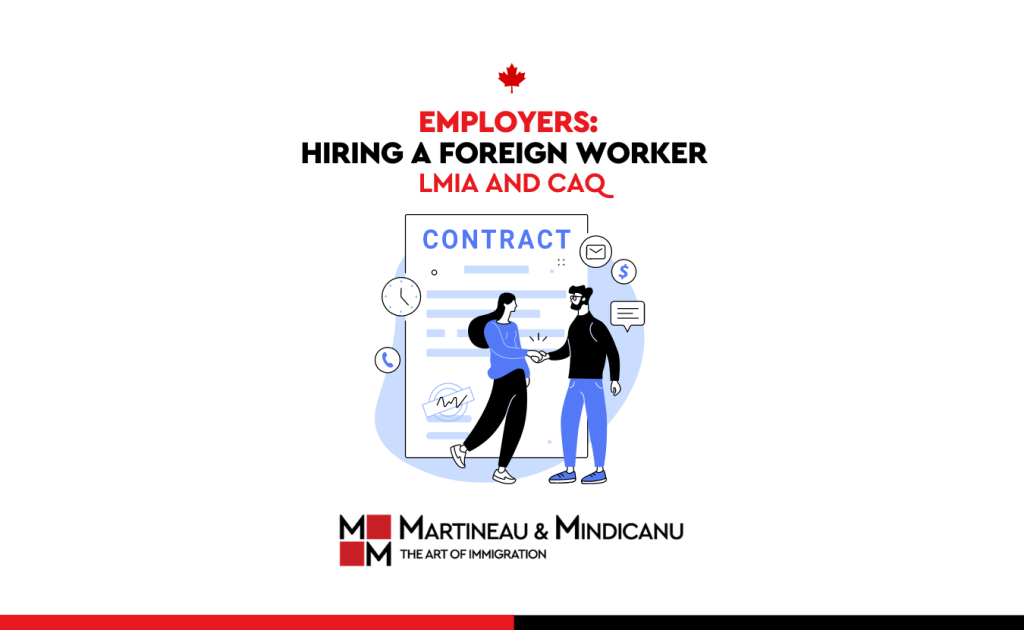As an employer, you often hear about LMIA and CAQ. These are obscure acronyms that often frighten or may refer to a procedure that is too long, too expensive, or too complicated. Let us explain the basics to help you become familiar with this often unfairly demonized process.

What is an LMIA? What are the main points of the procedure?
The Labour Market Impact Assessment (LMIA) is a federal government verification procedure. In short, it confirms that the employer will be a “good parent” to their future temporary foreign worker(s).
The government wants to ensure that you will be able to pay your workers, that the salary offered is the same as you would offer to a Canadian, that the job you are offering is real, that you are a healthy business, a business that complies with the law and needs labor that it would have difficulty finding locally to operate properly.
To do this, you will need to provide documentary evidence and adequate justifications.
Therefore, it is the employer’s responsibility to initiate the procedure. You cannot ask your future temporary foreign worker to handle this request for you or pay the government fees or professional fees for the application.
Please note that not all positions are equal when it comes to an LMIA procedure. An LMIA is not requested in the same way for a shelf stocker as it is for a web developer or agricultural worker. This procedure has several streams. It is essential to apply in the correct stream and understand which stream your position belongs to.
Global Talent Stream, High-Wage Positions Stream, Low-Wage Positions Stream, Simplified Processing for Eligible Positions, Agricultural Workers Stream, or Home Caregiver: we are here to guide you!
In many cases, the company will have to demonstrate sufficient recruitment efforts to hire a Canadian worker before having to resort to a foreign worker.
For companies located in Quebec, the LMIA application will be made jointly between the federal government and the provincial government. Over 200 professions are eligible for simplified processing of the LMIA in Quebec; the company is then exempt from demonstrating local recruitment efforts. Please note that simplified processing should not be confused with LMIA exemptions.
What is a CAQ?
For temporary foreign workers destined for Quebec, a temporary selection request must be made for each worker targeted by the LMIA. Through this process, they will obtain a Quebec Acceptance Certificate (CAQ) which will then allow them to apply for their work permit.
During this CAQ application, the Quebec government wants to ensure that the candidate is able to occupy the position for which they are destined. A butcher probably cannot occupy a qualified childcare educator position. But a butcher with 10 years of undeclared work experience in their country probably cannot occupy a butcher position in Quebec either. Likewise, if 5 years of experience are required for a position, a candidate cannot occupy it if they cannot prove 3 years of experience in a similar position. It may also be that a crane operator graduated in France cannot immediately occupy a crane operator position in Quebec. Hence the importance of adequate recruitment to fill your positions and avoid certain pitfalls.
Timelines
The timelines associated with an LMIA procedure vary and depend on several parameters. Your LMIA could be processed in 10 business days if it is part of the Global Talent Stream, in 9 business days if it is part of the Seasonal Agricultural Worker Program, and in 52 business days if it is part of the Low-Wage Positions Stream. These times vary constantly.
CAQ applications are processed jointly and do not incur additional processing delays.
However, delays related to the work permit application may be added. But this is on a case-by-case basis, as your candidate may be able to apply for their work permit at the point of entry, which would completely eliminate this delay.
Sometimes, depending on the type of position, it is necessary to post the position properly for 4 weeks before applying for an LMIA. This timeframe should also be considered when you want to hire a temporary foreign worker.
Costs
The processing fee for an LMIA with the federal government is $1000 per temporary foreign worker. If the position is located in Quebec, an additional $222 will be required for the Quebec Labour Market Impact Assessment. And $222 for the temporary selection request for each candidate. A total of $1444 per candidate as of 2024 official fees.
The employer must ensure payment of health insurance that covers emergency medical care as long as the temporary foreign worker is not covered by the health insurance of the province or territory where they work.
You may also need to add the cost of a round-trip plane ticket for your candidate depending on the stream to which your position belongs.
As you may have noticed, an LMIA procedure is somewhat case-by-case. The procedure for a video game tester position will not be the same as for a journalist position. The costs will not be the same whether you are in Alberta or Quebec. And the timelines will differ depending on the stream in which your application is processed, but also depending on the nationality of the candidate, and sometimes even where they are located.
Our office will be happy to guide you step by step through this process to facilitate your experience with temporary foreign workers should you require assistance.
Legal Notice
The content of this publication is general and does not pretend to be specific legal advice. For information on the application of Canadian immigration laws in your case, we invite you to schedule a personalized consultation.
Official Source
